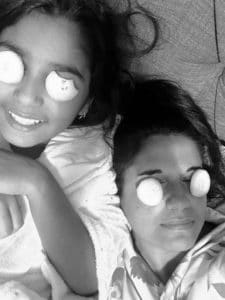Mental Health Exercises Should Be A Daily Habit… Like Brushing Your Teeth

More than 75% of Americans report symptoms of daily stress, including headaches, tiredness and sleeping problems. (American Psychological Association, 2019)
57% of these respondents feel paralyzed by stress. Paralyzed!!!
Most of us have either felt or at least know what the detrimental effects of stress can do to us mentally and physically. Most of us also know what we need to do to prevent or alleviate this stress, but we hardly follow through. I mean, who has the time to squeeze in therapy, yoga, decompression exercises, yada, yada, yada, into our days.
We are all guilty of not taking care of our mental and physical health at some point in our lives.
I would bet all the money in my pocket, however, that if you could prevent your child from feeling the detrimental effects from overwhelming stress, you would. Imagine our kids growing up having the tools to prevent or alleviate their stress?
Personally, having the tools in my back pocket through high school and college would have been so helpful, lessoning my anxiety, migraines, stomach aches… even acne! Transitioning into adulthood would have been an easier process. If only we normalized talking about mental health at that time.
Depression Rises Generationally
Gen Z, aka the Zoomers, report higher rates of stress and numerous other mental health conditions than generations before them. They are of course more likely to report mental health struggles as the stigma around mental stress lessens.
But Zoomers have also grown up during a very unique time. The most racially and ethnically diverse generation in the U.S., they’ve grown up through a time of war and terrorism, continued connectivity to the internet, phone and social networks, a recession, increased gun violence, text messaging, climate change, gender equality and let’s not forget, a global pandemic.
In fact, when asked to rate their stress level from one to ten, here’s how individuals in the U.S. responded by age group.
Stress Statistics By Age: (American Psychological Association, 2020)
- Gen Z: 6.1
- Millennials: 5.6
- Gen X: 5.2
- Baby Boomers: 4.0
- Older Adults: 3.3
Based on this trend, Generation Alpha, aged 10 and under, will naturally experience increased levels of stress as they get older… unless we correct this and teach them that taking care of their mental fitness needs to become a habit.
Our Nervous System
Our autonomic nervous system is divided into two components:
(1) sympathetic nervous system & (2) parasympathetic nervous system
They both perform differently, but both with very critical functions.
The sympathetic nervous system is the one responsible for our “fight-or-flight” stress response. Most of our physical and mental challenges are the result of the stress put on our sympathetic nervous system.
The parasympathetic nervous system, on the other hand, is the one I would like to focus on. This is the one that most of us neglect.
The parasympathic nervous system provides for the rest and digest response. It prepares our bodies for rest and also helps the digestive tract move along so our bodies can efficiently absorb nutrients from the food we eat.
With so much being thrown at our children these days, I believe it’s necessary to start focusing on their parasympathetic nervous system NOW.
Sometimes we believe our children aren’t affected by certain stressors but they are so intuitive. The following can severely affect their sympathetic nervous system.
- Problems amongst parents
- Social media
- Hormones
- Arguments with friends or siblings
- Academic pressure
- Self image and self esteem challenges
- Need for independence
- Birth of a new sibling
- Re/marriage of a parent
- Moving to a new school
- Familial financial stress
So, how do we balance our nervous system when dealing with stressors? Here are some helpful tools to teach your kids and most importantly, to practice alongside them.
- Play calming music
- Breathing exercises
- Reduce technology/IPad usage
- Mindful meditation: “A School Replaced Detention With Meditation.”
- Mindfulness classes
- Yoga
- Making calm a priority
- Focus on nutrition
- Reduce sugar
- Omit soda
9. Sensory calming practices
- Noise cancelling headphones
- Dim lighting
- Warm baths
- Hugs
- Smelling calming scents
If the parasympathetic nervous system is supposed to work as a brake for our bodies then why aren’t the above suggestions, which seem quite easy to implement, part of our everyday life.
We insist our kids brush their teeth to care for their oral hygiene.
We insist they wash their bodies to avoid infection and stay physically healthy.
Then why don’t we insist they practice meditation when they wake up to care for their mental sphere?
Why aren’t we making these practices a daily habit like brushing our teeth and bathing?
As someone who deals with anxiety and depression, one of my biggest fears is my daughter growing up with the same mental challenges and not being able to manage them.
My goal as a parent is to begin practicing the above suggestions with my daughter to see which she finds most relaxing and soothing. And as we have to nag her each day to brush her teeth and take a bath, I vow to myself to nag her to focus on her mental health each day!

Comments are closed